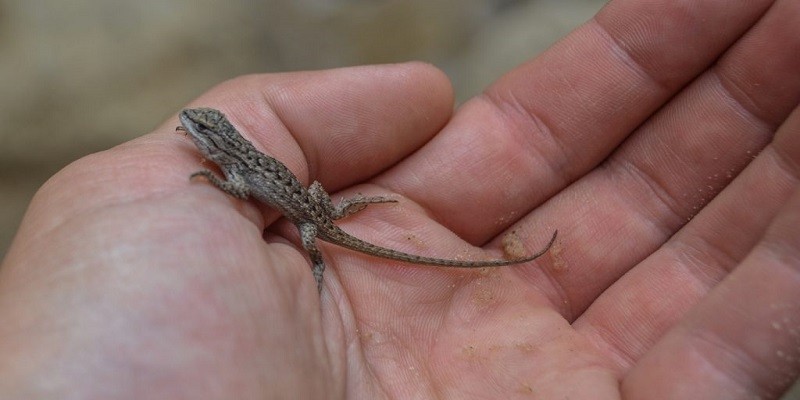Last Updated on January 15, 2025
Baby lizards eat a diet primarily consisting of small insects and invertebrates. They rely on these food sources to nourish and sustain their growth and development.
As a baby lizard emerges from its egg, it enters a world where finding food becomes its top priority. These young reptiles have voracious appetites and will actively hunt for small insects, spiders, worms, and other invertebrates. Their diet primarily consists of protein-rich food sources, which are essential for their growth and development.
Baby lizards have excellent eyesight and quick reflexes, allowing them to catch their prey with precision. As they mature, their diet may expand to include larger prey and even small vertebrates. Understanding a baby lizard’s diet is crucial for their overall health and well-being. By providing them with a balanced and appropriate diet, we can ensure their proper growth and development.
The Diet Of Baby Lizards
When it comes to the diet of baby lizards, understanding their nutritional needs is crucial for their healthy growth and development. Factors such as their species, age, habitat, and availability of food sources play a significant role in determining what these tiny reptiles eat. In this section, we will explore the various factors that influence the diet of baby lizards, their nutritional requirements for healthy growth, and debunk some common misconceptions about their diet.
Factors That Influence The Diet Of Baby Lizards
Several factors influence the diet of baby lizards. These factors determine their prey preferences and the nutritional composition they require to thrive.
- Species: Different species of baby lizards have varied dietary preferences. Some are herbivores, feeding on plants and insects, while others are carnivores, solely relying on a diet of small insects or other invertebrates. It’s essential to know the species of your baby lizard to provide an appropriate diet.
- Age: As baby lizards grow, their dietary needs change. Younger lizards may require more protein for growth, whereas older ones may need a more balanced diet.
- Habitat: The environment in which baby lizards reside significantly impacts their food availability. For example, lizards in urban areas may have access to different food sources than those in rural or natural habitats.
- Availability of food sources: The abundance or scarcity of their preferred food sources in their environment can influence what baby lizards eat. This availability can vary based on seasons, geographical locations, and other ecological factors.
Nutritional Requirements For Healthy Growth And Development
Providing baby lizards with a well-balanced diet is vital for their healthy growth and development. These tiny reptiles require specific nutrients to meet their nutritional needs:
- Protein: Baby lizards need an adequate amount of protein for muscle and tissue development. Insect-based food sources such as crickets, fruit flies, and mealworms are rich in protein and are often a staple in their diet.
- Calcium: Calcium is necessary for the proper growth and development of baby lizards’ bones and teeth. Dusting their food with calcium supplements or providing them with calcium-rich sources like leafy greens can help meet this requirement.
- Vitamins and minerals: Baby lizards also require a variety of vitamins and minerals for overall health. These can be obtained from a well-balanced diet that includes a mix of insects, fruits, vegetables, and calcium supplements.
Common Misconceptions About Baby Lizards’ Diet
There are a few misconceptions surrounding the diet of baby lizards that need to be addressed:
- Baby lizards only eat live insects: While insects are a crucial part of their diet, some species of baby lizards can also consume vegetation or fruits. It’s important to research and understand the specific dietary requirements of your baby lizard’s species.
- Baby lizards need to eat every day: Overfeeding baby lizards can lead to health issues. Many baby lizards need to eat every 1-3 days, depending on their species and age. It is essential to observe their feeding patterns and adjust accordingly.
- Baby lizards can eat any insect: Not all insects are suitable for baby lizards. Some insects may carry parasites or be toxic to them. Stick to safe and appropriate insect choices like crickets, mealworms, and roaches.
Understanding the diet of baby lizards is crucial for their overall health and well-being. By considering the factors that influence their diet, meeting their nutritional requirements, and debunking common misconceptions, you can ensure that your baby lizard receives the best care and diet possible.

Credit: www.youtube.com
Insects: A Staple Food For Baby Lizards
Insects are the primary food source for baby lizards, providing them with essential nutrients to support their growth and development. From the moment they hatch, baby lizards have a strong instinct to hunt and consume insects, making them a vital component of their diet. In this article, we will explore the variety of insects suitable for baby lizards, their nutritional value, and proper feeding techniques to ensure your little reptile gets the best start in life.
Variety Of Insects Suitable For Baby Lizards
When it comes to feeding baby lizards, offering a diverse range of insects is crucial for a healthy diet. Different species of lizards have varying tastes and preferences, so it’s essential to provide a variety of options for your little reptile. Here are some insects that are generally well-suited for baby lizards:
| Insect Type | Nutritional Value |
|---|---|
| Mealworms | Rich in protein and easy to digest, mealworms are an excellent staple food for baby lizards. They also contain essential vitamins, minerals, and fatty acids. |
| Crickets | High in protein and fiber, crickets are another popular choice for baby lizards. They provide essential nutrients such as calcium, which is vital for healthy bone development. |
| Phoenix worms | A nutritious option, phoenix worms are low in fat but high in calcium and protein. They have a soft exoskeleton, making them easier for baby lizards to consume. |
Nutritional Value Of Different Insect Types
Understanding the nutritional value of the insects you offer to baby lizards is crucial in ensuring a balanced diet. Here are the key nutrients provided by some commonly available insect types:
- Mealworms: high in protein, vitamins, minerals, and fatty acids.
- Crickets: rich in protein, fiber, calcium, and other essential nutrients.
- Phoenix worms: low in fat, high in calcium, and protein.
Proper Feeding Techniques For Offering Insects To Baby Lizards
Feeding insects to baby lizards requires some proper techniques to ensure they consume their food safely and efficiently. Here are some tips to follow:
- Gut-loading: Prioritize gut-loading the insects with nutritious food before feeding them to your baby lizard. This ensures that the insects carry optimal nutrients.
- Dusting: Regularly dust the insects with a reptile-specific calcium and vitamin supplement. This enhances the nutritional value of the insects for your baby lizard.
- Offering the right size: Ensure the size of the insects you offer is appropriate for your baby lizard. They should be small enough for the lizard to consume easily without any risk of choking.
- Feeding frequency: Baby lizards have high metabolisms, so they require frequent feeding. Offer small amounts of insects multiple times throughout the day to meet their nutritional needs.
- Monitoring: Keep a close eye on your baby lizard while they eat to ensure they are consuming the insects properly and not experiencing any difficulties.
By providing a variety of insects with high nutritional value and following the proper feeding techniques, you can ensure that your baby lizard receives a balanced diet and thrives in its early stages of life. Remember to consult a veterinarian or a reptile expert for specific dietary recommendations based on your lizard species.
Supplementation And Alternative Diets For Baby Lizards
When it comes to the diet of baby lizards, it’s important to ensure they receive the proper nutrition for their growth and development. While their main diet typically consists of live insects, supplementation and alternative diets can play a crucial role in providing a well-rounded nutritional plan for these tiny reptiles. In this section, we will explore the importance of calcium and vitamin supplementation, alternative food options for baby lizards, as well as potential risks and benefits associated with alternative diets.
Importance Of Calcium And Vitamin Supplementation
Calcium and vitamin supplementation is essential for the healthy growth and development of baby lizards. These young reptiles require adequate amounts of calcium to develop strong bones and prevent conditions like metabolic bone disease. Additionally, vitamins, such as vitamin D3, are crucial for proper calcium absorption in their bodies.
Baby lizards often struggle to acquire enough calcium and vitamins solely from their primary diet. Therefore, it’s important to ensure their diet is supplemented with calcium and vitamin powders specially formulated for reptiles. These powders can be dusted onto their food, providing essential nutrients that may be lacking in their prey.
Here are some important points to remember when it comes to calcium and vitamin supplementation for baby lizards:
- Choose a reputable brand of reptile-specific calcium and vitamin powders.
- Follow the manufacturer’s instructions regarding dosage and frequency of supplementation.
- Dust the baby lizard’s food with the recommended amount of calcium powder to ensure proper calcium intake.
- Consider providing a vitamin supplement a few times a month to ensure adequate vitamin levels.
Alternative Food Options For Baby Lizards
While live insects form the staple diet of baby lizards, there are alternative food options that can provide additional variety and nutrients. These alternative food sources can be used as occasional treats or substitutes when live insects are not readily available.
Here are some alternative food options that you can consider for your baby lizard:
| Food Option | Description |
|---|---|
| Commercial reptile diets | These specially formulated diets are available in pet stores and are a convenient option, providing a mix of nutrients required by baby lizards. |
| Fruits and vegetables | Small amounts of baby-friendly fruits such as mango, papaya, and squash, or finely chopped leafy greens can be offered as occasional dietary supplements. However, remember that insects should always form the main part of their diet. |
| Calcium-enriched baby food | Some baby food varieties enriched with calcium can be used as an occasional treat, but they should not be a regular replacement for live insects. |
Potential Risks And Benefits Of Alternative Diets
While alternative diets can provide some additional benefits and variety to the nutrition of baby lizards, they may also come with potential risks. It is important to carefully consider the risks and weigh them against the benefits when deciding to include alternative food options in their diet.
Here are some potential risks and benefits associated with alternative diets:
Risks:
- Some commercial reptile diets may not be nutritionally balanced, so it’s important to choose high-quality brands.
- Feeding too many fruits or vegetables can lead to excessive sugar intake, digestive issues, and nutrient imbalances.
- Excessive reliance on alternative diets can lead to inadequate intake of essential nutrients, especially protein.
Benefits:
- Alternative diets can provide added variety for baby lizards, reducing the risk of picky eating habits.
- Selective feeding of insects can sometimes lead to nutrient deficiencies, so alternative diets can help in bridging these gaps.
Remember, while alternative diets can supplement a baby lizard’s nutrition, they should never replace the primary diet of live insects. It’s essential to provide a balanced and varied diet to ensure the health and well-being of your baby lizard.
Frequently Asked Questions For What Do Baby Lizards Eat?
What Do Baby Lizards Eat For Their First Meal?
Baby lizards typically feed on small insects and invertebrates like ants, spiders, and crickets.
How Often Do Baby Lizards Need To Eat?
Baby lizards usually need to eat daily to fuel their rapid growth and development.
Can Baby Lizards Eat Fruits Or Vegetables?
While fruits and vegetables aren’t their main diet, some baby lizards may nibble on small pieces of soft fruits occasionally.
Do Baby Lizards Need Supplements In Their Diet?
In general, baby lizards derive all necessary nutrients from their prey and don’t require additional supplements.
Are There Any Specific Foods To Avoid Feeding Baby Lizards?
It’s best to avoid offering baby lizards larger prey or hard-shelled insects that may pose digestion difficulties.
How Long Does It Take For Baby Lizards To Transition To Adult Food?
Baby lizards gradually shift to a diet consisting of larger insects and prey as they grow, usually within a few months.
Conclusion
To summarize, baby lizards have specific dietary needs that must be met for their growth and development. Optimal nutrition can be achieved by providing a varied diet consisting of small insects and invertebrates. Understanding their preferences and ensuring a balanced diet is essential for the lizards’ overall health.
By incorporating these dietary considerations into their care, we can create a suitable environment where baby lizards can thrive.







